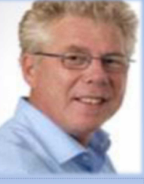应我系梁继东副教授邀请,来自荷兰瓦格宁根大学环境工程学科带头人Huub H. M. Rijnaarts教授将于2018年11月13日~2018年11月16日来我校进行学术交流,届时将作3次学术报告,欢迎广大师生前来学习和交流。
1. 报告人简介:
Name:
Professor Huub H. M. Rijnaarts

Current position:
Professor in Environment and Water Technology, Wageningen University, The Netherlands
Fields of expertise:
Water technology: Biological and Physical/Chemical Removal of Organics and Micro pollutants from Water, Soil and Groundwater; Sustainable Desalinization; Water Disinfection.
Environmental management: Urban/Industrial Harvest and safe resue of urban and industrial water and related carbon and nutrient resources.
Qualifications (diploma's, degrees):
1994: PhD Wageningen University
1988: MSc Wageningen University, cum laude
1986: BSc Wageningen University
Related Positions:
Since 2009: Chairman Sub-department of Environmental Technology Wageningen University
Since 2012: Director of Research School WIMEK, Wageningen University
2013-2018: Chairman Board Graduate School Sense
Since 2015: Member of Board of AMS, Amsterdam Institute of Advanced Metropolitan Solutions
Publications & Related award:
Publication: 120 peer reviewed scientific articles, 16 conference paper, 5 scientific reports, 4 book chapters.
Hisch index: 28
Citations: 3259
Related award: Chined4D NWO grant for china-The Netherlands interaction on urban sustainability
PhD's:
Graduated in 2009-2017, 2 graduations planned, 24 ongoing.
2. 报告时间、地点、题目和简介
报告一:Remediation of historical pollutions
地点:北二楼1402会议室 时间:2018-11-13, 9:00~11:00
Brief Introduction:
This lecture will be about historical soil sediment and groundwater pollution with organic chemicals as chlorinated solvents, BTEX, and oil and Polycyclic Aromatic Hydrocarbons, as has been dealt with in the Netherlands the past 30 years. It will show the transition from technological approaches oriented to full clean up in a short time frame - leaning on excavation and ex-situ clean-up which is very costly, towards inclusion of natural attenuation, in-situ bioremediation, and risk based approaches, taking more time reducing contamination to levels with acceptable risks. Concepts as source-path-receptor approaches and bioavailability are introduced as a base to come to remediation approaches with cost-efficiencies a factor of 10 better than classical dig, dredge & dump (Soil and sediments), and pump & treat (groundwater). Moreover, aquifer thermal energy storage integration with groundwater treatment and other more integrative solutions will be presented.
报告二:Removal of emerging, micro pollutants from water
地点:北二楼1402会议室 时间:2018-11-14, 16:10~18:10
Brief Introduction:
This lecture will be about emerging organic chemicals and where these can be removed from the water cycle. Different types of pollutants are addressed such as pharmaceuticals including antibiotics, personal care products, pesticides, and industrial chemicals. Waste water treatment plants (WWTP) are designed to remove nutrients and bulk organics at influent concentrations of 100~10.000 mg COD/L. Many organic micro-pollutants are present in sewage at ng-μg-mg level, and not or only partly degraded in current WWTPs therefore requiring post treatment of effluents to avoid their emission into the aquatic environment. Different forms of treatment, biological, physical chemical and combined technologies are presented for different compounds and their effectivity is being.
报告三:Biopolymers in waste water treatment for environmental technological application
地点:北二楼1402会议室 时间:2018-11-16, 14:15~16:15
Brief Introduction:
This lecture will be on the transition of traditional waste water treatment (WWT), focusing on maximizing COD removal at the lowest costs by reducing chemical and energy input and sludge production, towards WWT that include maximizing carbon recovery in the form of biomass or extracellular polymeric substances for further processing to useful products. First the basic mechanisms of polymers in adhesion, and sludge and granule formation are being discussed for various water technology contexts. The salinity and ionic composition of the water is an important parameter in these processes. From this different technology configurations are presented to maximize granulated biomass formation and flocculent polymer production. Results on the performance of different polymers in flocculent activity or controlled and functional biofilms are being presented.